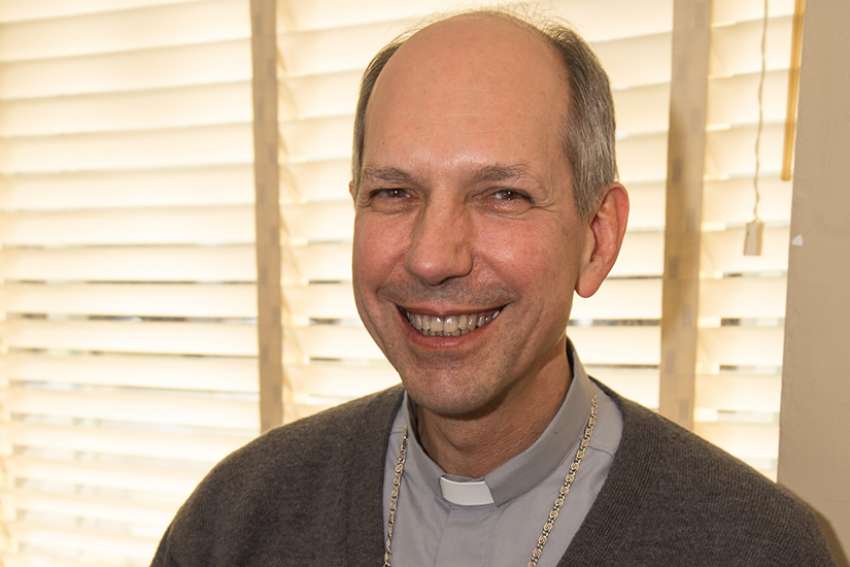It goes back to when he took part in a Prairie Walk, a tour of the land to discover its past. Bolen, who grew up on the Prairies, knew the land’s history dating back to his grandparents and great-grandparents. Saskatchewan, as far as most people knew, dated back only to the late 1800s and early 1900s (Saskatchewan joined Confederation in 1905). Bolen inquired of the tour guide about the oldest settlement in the province and where it was located. He was told it was an Indigenous settlement discovered between Aneroid and Ponteix, in southwest Saskatchewan, with roots dating back 7,500 to 8,500 years.
What struck Regina’s archbishop about this was not so much how long ago the land was settled, but that he had no knowledge of this.
“This was a half hour from our farm and I knew nothing about it,” Bolen said.
And that’s why we can’t just move on, Bolen told a crowd gathered in Melville, Sask., April 21 for the archdiocese’s 14th annual Social Justice in Motion Conference. The theme was “Why We Can’t Just Get Over It and Move On! Paths Toward Reconciliation.”
One of those paths is the establishment of Regina’s own Archdiocesan Commission for Truth and Reconciliation.
“(We are) totally moving forward,” said Bolen, who has made no secret of his wish to prioritize reconciliation in his diocese. “It’s our number one pastoral priority. We’ve got a ton of initiatives going forward here,” with education at the forefront.
A number of suggestions were brought forth on how parishes could engage in healing and reconciliation, with building or strengthening relations with Indigenous peoples high on the list.
“We have not learned as a people here,” said Bolen, speaking about knowledge of the true Prairie past. “We’re just in the process of learning how to tell our story in such a way that it really pays attention to Indigenous people and the impact on them of a settler society coming and what happened to them, the effects of colonization.”
One of the 95 Calls to Action in the Truth and Reconciliation Commission’s report on the Canadian-Indigenous past that resonates with the archbishop is the one calling for a new telling of our story as a people, going beyond the European settlers.
“The way we’ve told our story as a people in Saskatchewan is a strongly diminished telling of the story,” he said.
The TRC has done a service to Canadians, said Bolen, opening up a story and schooling us on “untold depths of pain.”
“The Calls to Action addressed to the churches are a way into that pain, and provide a way for the Church to walk in solidarity with Indigenous people today,” he said. “They aren’t the only way, but we have experienced that they are helpful in learning a new way of walking with Indigenous people.”
While the wheels have been set in motion to address these calls, the process has been slow. Getting the most attention of late has been the invitation to Pope Francis to appear on Canadian soil and provide an apology to Indigenous people for the wrongs suffered in the residential school system. Francis has declined “to personally respond,” Canada’s bishops announced, though the Pope says he is open to coming to Canada in the future.
Saskatchewan archbishop charts a new path to reconciliation
By Mickey Conlon, The Catholic RegisterREGINA – Archbishop Donald Bolen can tell you why we can’t just get over it and move on when it comes to our relationship with Canada’s Indigenous people.
Please support The Catholic Register
Unlike many media companies, The Catholic Register has never charged readers for access to the news and information on our website. We want to keep our award-winning journalism as widely available as possible. But we need your help.
For more than 125 years, The Register has been a trusted source of faith-based journalism. By making even a small donation you help ensure our future as an important voice in the Catholic Church. If you support the mission of Catholic journalism, please donate today. Thank you.
DONATE

